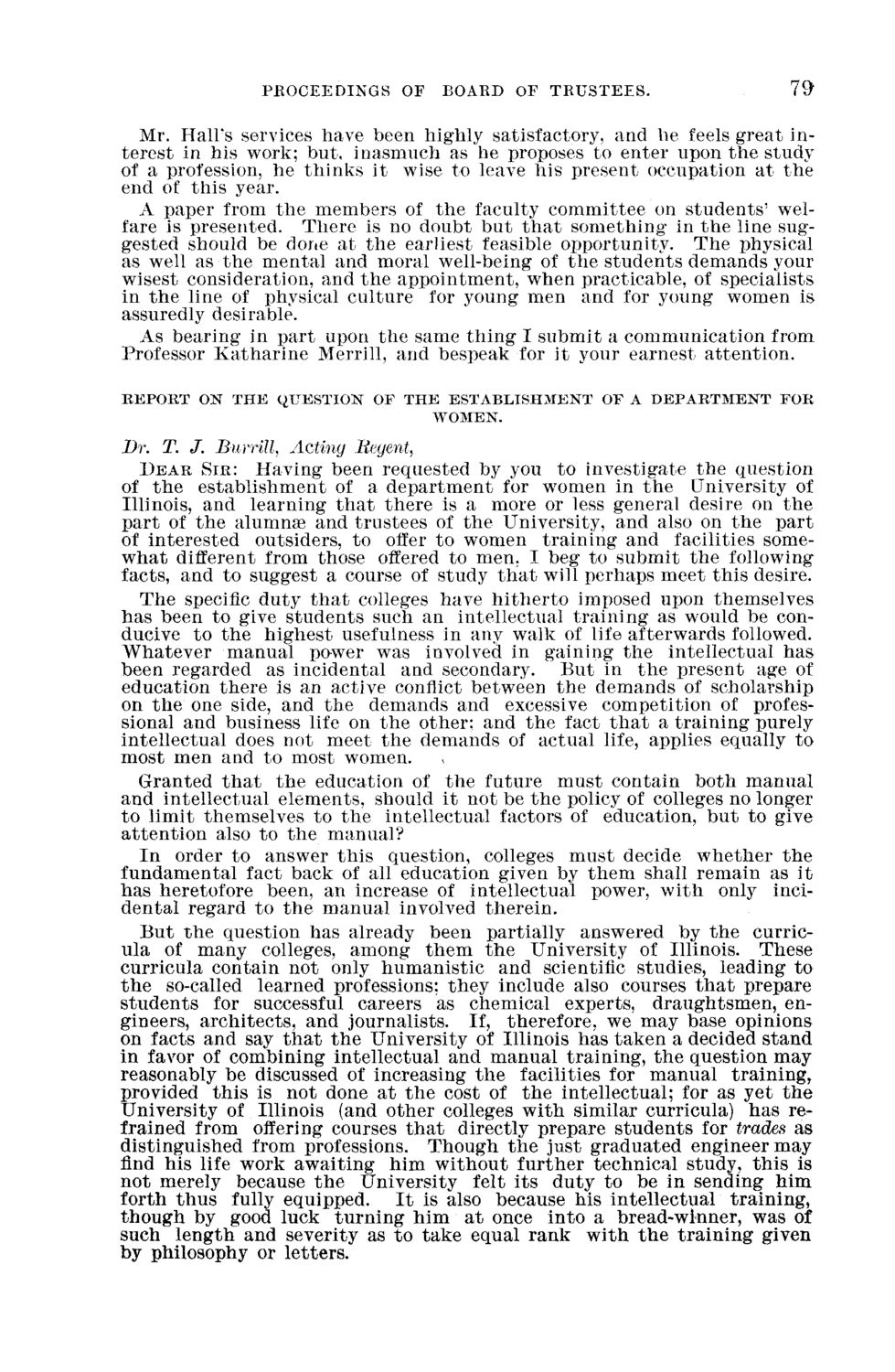| |
| |
Caption: Board of Trustees Minutes - 1894
This is a reduced-resolution page image for fast online browsing.

EXTRACTED TEXT FROM PAGE:
PROCEEDINGS OF BOARD OF TRUSTEES. 79 Mr. Hall's services have been highly satisfactory, and he feels great interest in his work; but, inasmuch as he proposes to enter upon the study of a profession, he thinks it wise to leave his present occupation at the end of this year. A paper from the members of the faculty committee on students' welfare is presented. There is no doubt but t h a t something in the line suggested should be done at the earliest feasible opportunity. The physical as well as the mental and moral well-being of the students demands your wisest consideration, and the appointment, when practicable, of specialists in the line of physical culture for young men and for young women is assuredly desirable. As bearing in part upon the same thing I submit a communication from Professor Katharine Merrill, and bespeak for it your earnest attention. REPORT ON T H E QUESTION OF T H E ESTABLISHMENT OF A D E P A R T M E N T FOR WOMEN. Dr. T. J. Burrill, Acting Begent, D E A R SIR: Having been requested by you to investigate the question of t h e establishment of a department for women in the University of Illinois, and learning t h a t there is a more or less general desire on the part of the alumnas and trustees of the University, and also on the part of interested outsiders, to oifer to women training and facilities somewhat different from those offered to men, I beg to submit the following facts, and to suggest a course of study t h a t will perhaps meet this desire. The specific duty t h a t colleges have hitherto imposed upon themselves has been to give students such an intellectual training as would be conducive to the highest usefulness in any walk of life afterwards followed. Whatever manual power was involved in gaining the intellectual has been regarded as incidental and secondary. But in the present age of education there is an active conflict between the demands of scholarship on the one side, and the demands and excessive competition of professional and business life on the other; and the fact t h a t a training purely intellectual does not meet the demands of actual life, applies equally to most men and to most women. Granted t h a t the education of the future must contain both manual and intellectual elements, should it not be the policy of colleges no longer to limit themselves to the intellectual factors of education, but to give attention also to the manual? I n order to answer this question, colleges must decide whether the fundamental fact back of all education given by them shall remain as it has heretofore been, an increase of intellectual power, with only incidental regard to the manual involved therein. But the question has already been partially answered by the curricula of many colleges, among them the University of Illinois. These curricula contain not only humanistic and scientific studies, leading to t h e so-called learned professions; they include also courses t h a t prepare students for successful careers as chemical experts, draughtsmen, engineers, architects, and journalists. If, therefore, we may base opinions on facts and say t h a t the University of Illinois has taken a decided stand in favor of combining intellectual and manual training, the question may reasonably be discussed of increasing the facilities for manual training, provided this is not done at the cost of the intellectual; for as yet the University of Illinois (and other colleges with similar curricula) has refrained from offering courses t h a t directly prepare students for trades as distinguished from professions. Though the just graduated engineer may find his life work awaiting him without further technical study, this is not merely because the University felt its duty to be in sending him forth thus fully equipped. I t is also because his intellectual training, though by good luck turning him at once into a bread-winner, was of such length and severity as to take equal rank with t h e training given by philosophy or letters.
| |